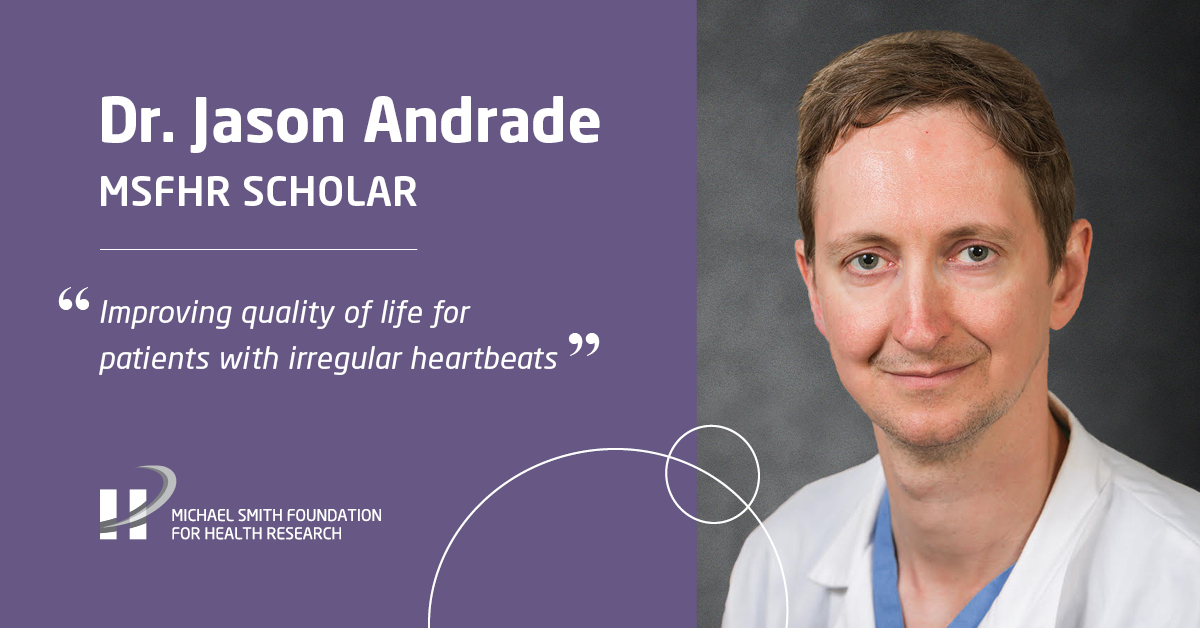MSFHR Scholar leading the way to improve quality of life in patients with irregular heartbeat
17 February 2021

New research led by MSFHR Scholar Dr. Jason Andrade is poised to have a sweeping impact on how patients with atrial fibrillation are first treated after receiving their diagnosis.
Atrial fibrillation, or an irregular heartbeat, is the most common heart rhythm disease, impacting approximately one to two percent of the population. The disease is characterized by chaotic electrical impulses in the upper chambers of the heart, leading to an irregular heart rhythm, also known as arrhythmia. For years, doctors have treated atrial fibrillation consistently: medicines are used first, and only if those fail, a surgical procedure called ablation is employed.
But what if ablation was used first? Would patients have better health outcomes?
Dr. Andrade and his research team explored this question through a large, multi-centre randomized study. The findings, published in The New England Journal of Medicine and presented at a recent American Heart Association Scientific Sessions meeting, show a significant difference in patient outcomes — with one patient in four having a lower rate of recurrence.
“The theory is that an ablation procedure targets the source of the arrhythmia in a more permanent manner,” said Dr. Andrade. “It may actually alter the disease and progression, whereas the medicines may be like taking Tylenol for pain. It makes the pain go away but it doesn’t get rid of the reason why you have the pain.”
Called EARLY-AF, Dr. Andrade’s study involved 18 centres spread coast-to-coast across Canada, with Vancouver General Hospital as the lead site. A total of 303 patients were enrolled in the study and randomly assigned to either undergo the ablation procedure or receive antiarrhythmic medicines as a first-line treatment. A monitor was then implanted under each patient’s skin to precisely record their heart beat continuously, day and night.
After a 12-month period, the research team found that patients who received the ablation procedure were less likely to have recurrent atrial fibrillation, were more likely to be asymptomatic, and had a significantly better quality of life compared to those treated with medicines. Adverse events were similar between the two groups.
“The results of this study will impact management because now we can have a more informed conversation with patients at the beginning of their journey with atrial fibrillation,” said Dr. Andrade. “We know that there is a significant difference in arrhythmia recurrence between the treatment groups, which translates into meaningful differences in how patients feel and how they perceive their health status.”
Dr. Andrade’s team is continuing to monitor the patients in the study for three more years. This will allow them to see how the disease trajectory continues to evolve over the long term.
“Ultimately we want to ensure we are helping people live better, more fulsome lives with their atrial fibrillation,” said Dr. Andrade.
In addition to his research, Dr. Andrade is a clinical cardiac electrophysiologist at Vancouver General Hospital, as well as director of Electrophysiology and the Atrial Fibrillation Clinic. He is also the medical chair for Heart Rhythm Disease, in the BC Cardiovascular Disease Network, and co-chair of the Canadian Cardiovascular Society atrial fibrillation guidelines.
In 2014, Dr. Andrade received an MSFHR Scholar award for earlier work related to ablation and atrial fibrillation, which was presented at the European Heart Rhythm Association meeting and subsequently published in Circulation in 2019. The EARLY-AF Steering Committee also included Dr. Marc Deyell, who also received an MSFHR Scholar award in 2014.
The MSFHR Scholar Program supports early-career health researchers who are building leading-edge health research programs, training the next generation of scientists, and expanding their potential to make significant contributions to their field. The Scholar Program is one of MSFHR’s flagship funding opportunities, helping to develop, retain and attract the people whose research improves the health of British Columbians, addresses health system priorities, creates jobs, and adds to the knowledge economy.





